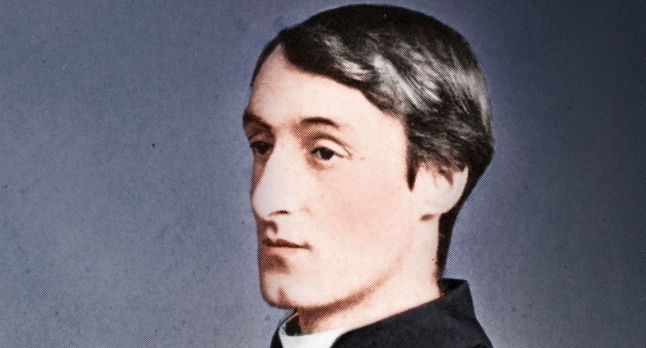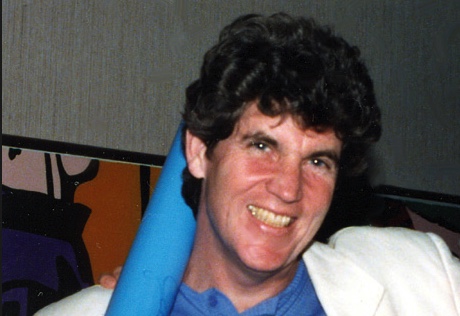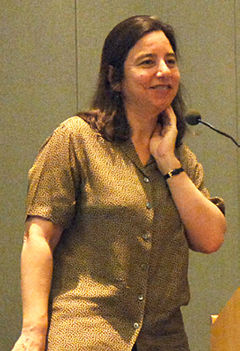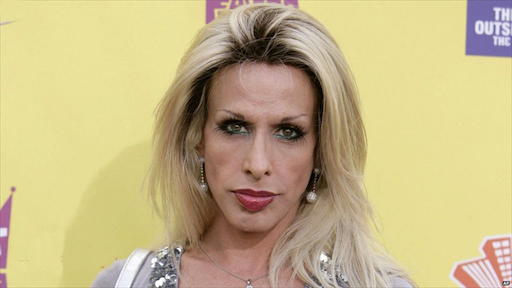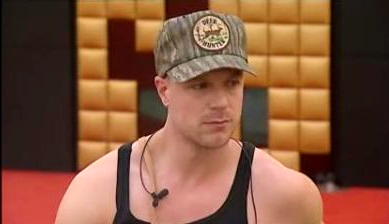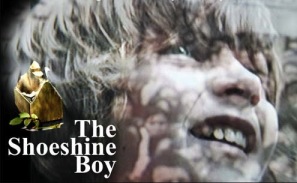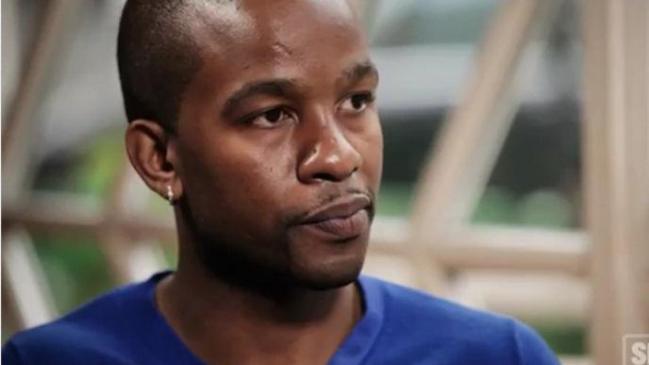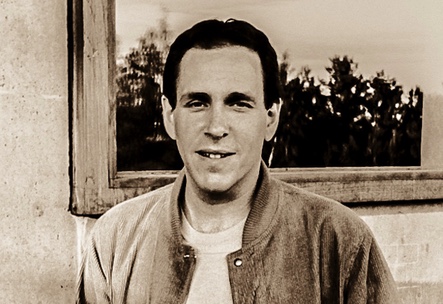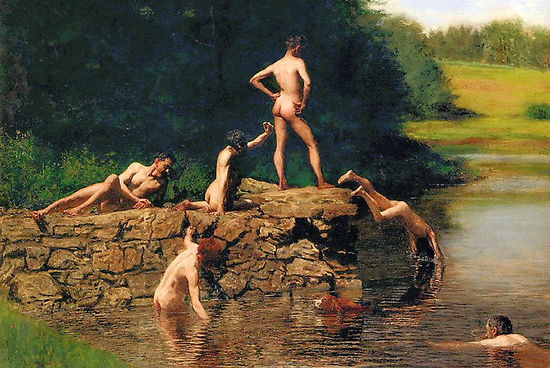|
presents THIS DAY IN GAY HISTORY based on: The White Crane Institute's 'Gay Wisdom', Gay Birthdays, Gay For Today, Famous GLBT, glbt-Gay Encylopedia, Today in Gay History, Wikipedia, and more …
Collected by Ted July 28 [{(o)}]|[{(o)}]|[{(o)}]|[{(o)}]| [{(o)}]|[{(o)}] 600 B.C – The Greek poet Theognis is born near Athens. He was an aristocrat who lost his wealth and property during one of the many civil wars of the period and turned to writing, penning most of his works for his young lover Cyrnus.
1533 –Walter Hungerford (1503—1540), First Baron Hungerford of Heytesbury, is the first person executed under the British Buggery Act of 1533.
At Balliol College, Oxford (1863-67) he studied classics. Hopkins was an unusually sensitive student and poet, as witnessed by his class-notes and early poetic pieces. It was at Oxford that he forged a lifelong friendship with Robert Bridges (eventual Poet Laureate of the United Kingdom) which would be of importance in his development as a poet, and his posthumous acclaim. Hopkins was deeply impressed with the work of Christina Rossetti and she became one of his greatest contemporary influences, meeting him in 1864. During this time he studied with the prestigious writer and critic Walter Pater, who tutored him in 1866 and who remained a friend till September 1879 when Hopkins left Oxford Hopkins began his time in Oxford as a keen socialite and prolific poet, but he seemed to have alarmed himself with the changes in his behaviour that resulted, and he became more studious and began recording his "sins" in his diary. As an undergraduate he engaged in friendships that may be viewed as romantic, though they tended to be idealised and spiritualised. In particular, he found it hard to accept his sexual attraction to other men, including a deep infatuation for Digby Mackworth Dolben. There is nothing to suggest, however, any physical consummation and indeed he seems to have remained celibate throughout his life. He exercised a strict self-control in regard to his homosexual desire, especially after he became a follower of Henry Parry Liddon and of Edward Pusey, the last member of the original Oxford Movement. It was during this time of intense scrupulosity that Hopkins seems to have especially begun confronting his strong homoerotic impulses and began to consider choosing the cloister. Although a brilliant scholar, Hopkins failed his final theology exam which limited his career in the clergy, although ordained. Short (5ft 2in.), gloomy and odd, he was not an effective teacher either, although he was a professor of Greek literature at University College, Dublin; but he was a lifelong poet of considerable brilliance (if a gloomy kind of brilliance) and influence. He was particularly influential in creating a new form of rhythm by combining different traditions of poetry into something completely new, which effectively pre-dated the free verse of 20th century poetry. Plagued by ill health for much of his life, Hopkins died of typhoid fever on 8 June 1889, aged only 45, and is buried in Dublin. Little known during his lifetime, he had an enthusiastic audience of motley fellow poets but it was his university friend and supporter Robert Bridges who brought Gerard Manley Hopkins work to prominence when he, by then Poet Laureate, published the first collected edition of his late friend's work. Although it is unlikely that the sexually-repressed Catholic priest, Hopkins would have considered himself to be homosexual, his poetry reveals that he considered male beauty to be one of the most splendid witnesses of the divine; his diaries reveal something of a tortured obsession with actual male beauty.
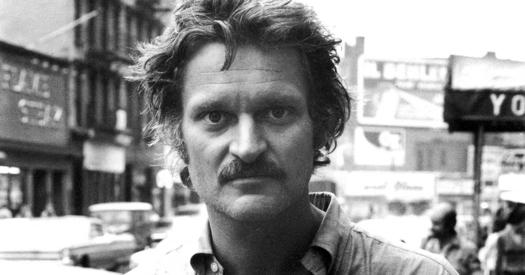
1927 – Born: John Ashbery, an American poet who has won nearly every major American award for poetry and is recognised as one of America's most important, though still controversial, poets. (d.2017) "No figure looms so large in American poetry over the past 50 years as John Ashbery", Langdon Hammer, chairman of the English Department at Yale University, wrote in 2008. "No American poet has had a larger, more diverse vocabulary, not Whitman, not Pound". Stephen Burt, a poet and Harvard professor of English has compared Ashbery to T.S. Eliot, the "last figure whom half the English-language poets alive thought a great model, and the other half thought incomprehensible". Ashbery was born in 1927 near Rochester, New York. He is author of more than fifteen books of poems, beginning with Turandot and Other Poems in 1953, and is considered one of the leading contemporary American poets. His works range in length from two-line poems and haiku to the book-length Flow Chart. Ashbery is often referred to as a philosophical poet. He is clearly concerned with the nature of language and its connection to thought. He is also concerned more specifically with the nature of poetry and its boundaries in the second half of the twentieth century, as well as with the relationship between poet and reader. Although Ashbery's poems often have the feel of autobiography, he does not include his own life in his poetry in a recognisable way. His claim to being a gay poet depends more on his friendship with Frank O'Hara and his inclusion in O'Hara's poems than it does on anything in his own writing. The critic and poet Richard Howard makes a distinction between "homosexual writers" and "writers who are homosexual." Although most Ashbery criticism places him in the latter category, ignoring questions of sexual preference either in his life or the poems, there have been a few attempts to read Ashbery as a gay poet. Despite the lack of explicit gay content, for example, his work shares concerns with other late twentieth-century gay writing. Ashbery probes the nature of identity, how a person constructs his own identity and that of others, and the degree to which that identity depends on the culture around us. In the early 1970s, Ashbery began teaching at Brooklyn College, where his students included poet John Yau. In the 1980s, he moved to Bard College, where he is the Charles P. Stevenson, Jr., Professor of Languages and Literature. He was the poet laureate of New York state from 2001 to 2003, and also served for many years as a chancellor of the Academy of Poets. Ashbery lived in New York City and Hudson, New York, with his husband, David Kermani, who in 2017 announced Ashbery's death of natural causes to the press.
1928 – The Netherlands: Opening of the 1928 Olympics where French athlete Violette Morris (1893 – 1944) had been barred from competing because she was a lesbian and because she and her female lover made their affair public. Her lover left Morris after the athlete had decided to undergo a double mastectomy to fit into race cars more easily. She won two gold and one silver medals at the Women’s World Games in 1921–1922. Starting in 1936 she worked with the Gestapo during World War II. She was killed in 1944 in a Resistance-led ambush as a traitor to the French state.
1941 – Colin Higgins (d.1988), Hollywood director and screenwriter. Born in the South Pacific island of New Caledonia to an Australian mother and American father, Higgins moved with his family to Redwood, CA from Sydney in the fifties. After attending Stanford University for a year, he dropped out to hitchhike across the country. His travels took him first to the Actors Studio in New York and then to Europe where he volunteered for the Army as a sports reporter for The Stars and Stripes. He eventually returned to Stanford to receive his degree in English and later attended film school at UCLA. During his final year, he wrote the screenplay for Harold and Maude. While today it is considered to be one of the great Hollywood movies, Harold and Maude was a huge flop when it opened during the Christmas season of 1971 with little fanfare and advertising. The unusual romance between a young man and a much older woman, starring Bud Cort and Ruth Gordon, struck a chord with audiences and soon became a cult favorite around the world. His stage version ran in Paris for seven years. Following the success of Harold and Maude, Higgins went on to write and direct some of the most successful films of the 70s and 80s, working with some of the biggest names in Hollywood, including Jane Fonda, Goldie Hawn, Richard Pryor and Burt Reynolds. His films include Silver Streak, Foul Play, Nine to Five and The Best Little Whorehouse in Texas. In 1986, Higgins established a foundation in his name to further his humanitarian concerns. The Foundation annually awards the Colin Higgins Youth Courage Awards for "bravery in the face of discrimination, intolerance and bigotry based on sexual orientation and/or gender." That same year, he also completed a television mini-series based on Shirley MacLaine's book Out on a Limb, which turned out to be his last film project. Higgins died of AIDS in 1988.
1958 – Sarah Schulman , American novelist, historian and playwright, born in New York City. An early chronicler of the AIDS crisis, she wrote on AIDS and social issues, publishing in The Village Voice in the early 1980s, and writing the first piece on AIDS and the homeless, which appeared in The Nation. She is openly a lesbian. Her books include: People In Trouble, describing the lives of AIDS activists; Empathy, My American History (1994); Rat Bohemia (1995); Shimmer ; Girls, Visions and Everything: a novel (1999). Her most recent work is the acclaimed Ties that Bind: Familial Homophobia and Its Consequences (2009). Schulman is a Professor of English at the City University of New York (CUNY), the College of Staten Island and a Fellow at The New York Institute for the Humanities at NYU. Schulman has pursued an active career in the theater. From 1979-1994 she had 15 plays produced in the context of the avant garde "Downtown Arts Movement" based in New York City's East Village. In 1992, Schulman and five others co-founded the Lesbian Avengers, a direct action organization. On her 1992 book tour for Empathy, Schulman visited gay bookstores in the South to start chapters. The organization's high points included sending groups of young organizers to Maine and Idaho to assist local fights against anti-gay ballot initiatives that were being funded by national right-wing organizations. They also organized the first Dyke March, which is now an international tradition
1961 – Illinois becomes the first U.S. state to repeal its sodomy law.
1969 – Alexis Arquette, American actor born (né Robert Arquette) (d.2016) was an American male-to-female transgender actress. Musician, and cabaret drag performer, Arquette's siblings are actors Patricia, Rosanna, Richmond and David Arquette. Arquette was also Courteney Cox's sister-in-law, as Cox is married to Alexis' brother David. At twenty-two, Arquette landed her first significant acting role, playing a transvestite Georgette in Last Exit to Brooklyn. Sixteen years later, she went through her own transition from male to female, an experience that was documented in the film, Alexis Arquette: She's My Brother, which debuted at the 2007 Tribeca Film Festival The majority of Arquette's film work was in low-budget or independent films. Her starring roles include Jumpin' at the Boneyard (as a crack addict), acting opposite Tim Roth, and New Zealand-shot fantasy Jack Be Nimble, as a man seeking revenge for a hellish childhood, and low budget comedy Killer Drag Queens on Dope, as a murderous drag queen. Arquette appeared in supporting roles in mainstream films, including Pulp Fiction, Threesome, Bride of Chucky and a memorable appearance as a Boy George fanatic in The Wedding Singer singing "Do You Really Want to Hurt Me?" over and over. In 2001, Arquette played the emperor Caligula in two episodes of the television show Xena: Warrior Princess. Arquette died on September 11, 2016, surrounded by close family. Arquette was serenaded with David Bowie's "Starman". Arquette had lived with HIV for 29 years prior to her death; the cause of death was cardiac arrest following a heart infection complicated by her HIV condition.
He holds a record of surviving eviction 6 times, the most in Big Brother UK history. On the night of the Final, Richard came fourth. From October 2006 Richard worked on the award-winning digital station GaydarRadio, hosting his own weekend show and co-hosting the Dickie & Dolly Show with former BB housemate and now good friend, Lea. Richard left the station after a shake-up of the schedule of Gaydar Radio was announced in July 2008 . Richard has since become an accomplished freelance writer contributing mainly to the gay press in the UK, Europe and his native Canada. He has written for Boyz, QX, Scene 24/7 and Winq Magazine. Richard also writes his own blog, Richard Says! Musings From a Former Reality Star.
Emanuel Jaques was the son of impoverished Portuguese immigrants from the Azores. On July 28, 1977, 12-year-old Jaques, who worked daily shining shoes on what was then the seedy Yonge Street Strip, was lured into an apartment above the Charlie's Angels body-rub parlour on Yonge Street with the promise of $35 for help moving photographic equipment. He was then restrained and repeatedly sexually assaulted over a period of twelve hours before being strangled and drowned in a kitchen sink. Several days after Jaques's disappearance, well-known Toronto gay activist George Hislop received a late-night call from Saul David Betesh, who confessed to the murder and told Hislop that Jaques's body had been hidden under a pile of wood on the roof of the building at which he had been abducted. Hislop arranged for Betesh to hire a lawyer, contacted Metropolitan Toronto Police and then persuaded Betesh to turn himself in. On a tipoff from Betesh, three other men — Robert Wayne Kribs (41), Joseph Woods (26) and Werner Gruener (28) — were arrested on the Super Continental train to Vancouver as it passed through Sioux Lookout, Ontario. The three were employed as security doormen at Charlie's Angels. The four were charged with Jaques's murder. According to evidence introduced at trial, Betesh held the boy under water until he drowned while Kribs restrained Jaques's legs. In 1978, Kribs pleaded guilty to first-degree murder and a jury found Betesh guilty of the same charge, while Woods was convicted of second-degree murder, and Gruener, who had held open the door of the body-rub parlour to allow Betesh to bring the boy in, was acquitted.
1977 – Wade Davis is a former American football player. A defensive player, Davis played college football at Weber State. He was on the preseason rosters of three different NFL teams in the early 2000s, but never made the final roster for the regular season. In 2012, Davis came out and spoke publicly about what it was like to be a closeted homosexual in the NFL. "I think subconsciously I think I understood, the way I was raised that being gay was wrong and there was no way that my family, at least in my mind would accept me, and also that my football family would accept me just because the perception that being gay meant you're less masculine," Wade said. Wade remembers a time in Tennessee when a teammate saw something different in him. The teammate told Wade that he would make the team as long as he didn't give anyone a reason to suspect him of being gay. Wade went out that evening and spent $1,500 at a strip club so that there was no inclination that anything was different about him. Since his playing days, Wade has been living what he calls his second dream. He works at the Hetrick Martin Institute, which is an LGBTQ non-profit organization where gay, lesbian and nonconforming youth can find great services and a sense of family if they don't have that. "I get to do a job every day that changes lives," Wade said. Watch the interview (7 mins 22 secs):
1987 – Gay filmmaker Arthur Bressan, Jr., American film-maker dies of complications from AIDS. Ironically, his film Buddies was one of the first feature films to deal with AIDS. All of his films were low budget productions, and dealt with gay characters and storylines. Although the bulk of his output was in the gay pornography genre, he wrote and directed Buddies. Released in 1985, Buddies was the first American feature film on the subject of the AIDS pandemic. Other films included Gay USA (1978), a documentary film about the burgeoning gay rights movement in America that came at a time when that movement was facing backlash from people such as Anita Bryant, and Abuse ([1983), a dramatic film about a young, effeminate boy who seeks out an older gay man to escape his parents, who torture him in their home. Copies of Abuse and Buddies are held by the Hormel Center at the San Francisco Public Library as part of a collection donated by the Frameline Film Festival. Bressan died of an AIDS-related illness on July 28, 1987.
1989 – William Cruse is sentenced to death for a shooting spree in Palm Bay, Florida, that left six people dead and ten injured. He said he did it because his neighbors were spreading rumors that he was a homosexual.
[{(o)}]|[{(o)}]|[{(o)}]|[{(o)}]| [{(o)}]|[{(o)}] TODAY'S GAY WISDOM: Gerald Manley Hopkins A telling instance of Gerard Manley Hopkins's sublimated homoeroticism is the "Epithalamion" that he began as a wedding gift for a younger brother and his fiancée. Its initial description of a rural paradisal setting in which the young heterosexual lovers may roam as a prelapsarian Adam and Eve is quickly overtaken by the poet's homoerotic fantasy of "a listless stranger" who is restored to joy by the sight of naked boys frolicking in a secluded pool. "Here [the stranger] feasts: lovely is all," the poet exclaims.
Epithalamion Hark, hearer, hear what I do; lend a thought now, make believeWe are leafwhelmed somewhere with the hood Of some branchy bunchy bushybowered wood, Southern dene or Lancashire clough or Devon cleave, That leans along the loins of hills, where a candycoloured, where a gluegold-brown Marbled river, boisterously beautiful, between Roots and rocks is danced and dandled, all in froth and waterblowballs, down. We are there, when we hear a shout That the hanging honeysuck, the dogeared hazels in the cover Makes dither, makes hover And the riot of a rout Of, it must be, boys from the town Bathing: it is summer’s sovereign good. By there comes a listless stranger: beckoned by the noise He drops towards the river: unseen Sees the bevy of them, how the boys With dare and with downdolphinry and bellbright bodies huddling out, Are earthworld, airworld, waterworld thorough hurled, all by turn and turn about. This garland of their gambols flashes in his breast Into such a sudden zest Of summertime joys That he hies to a pool neighbouring; sees it is the best There; sweetest, freshest, shadowiest; Fairyland; silk-beech, scrolled ash, packed sycamore, wild wychelm, hornbeam fretty overstood By. Rafts and rafts of flake-leaves light, dealt so, painted on the air, Hang as still as hawk or hawkmoth, as the stars or as the angels there, Like the thing that never knew the earth, never off roots Rose. Here he feasts: lovely all is! No more: off with—down he dings His bleachèd both and woolwoven wear: Careless these in coloured wisp All lie tumbled-to; then with loop-locks Forward falling, forehead frowning, lips crisp Over finger-teasing task, his twiny boots Fast he opens, last he offwrings Till walk the world he can with bare his feet And come where lies a coffer, burly all of blocks Built of chancequarrièd, selfquainèd rocks And the water warbles over into, filleted with glassy grassy quicksilvery shivès and shoots And with heavenfallen freshness down from moorland still brims, Dark or daylight on and on. Here he will then, here he will the fleet Flinty kindcold element let break across his limbs Long. Where we leave him, froliclavish while he looks about him, laughs, swims. Enough now; since the sacred matter that I mean I should be wronging longer leaving it to float Upon this only gambolling and echoing-of-earth note— What is … the delightful dene? Wedlock. What the water? Spousal love. The scene he has set is brilliantly homo-erotic, but he is really unable to rationalize his supposed metaphor for marriage. No amount of pious commentary can recover the poem from its unintended digression to this sensual scene from its intended celebration of "spousal love."
[{(o)}]|[{(o)}]|[{(o)}]|[{(o)}]| [{(o)}]|[{(o)}] |
